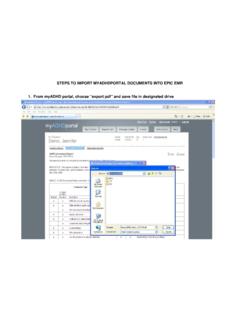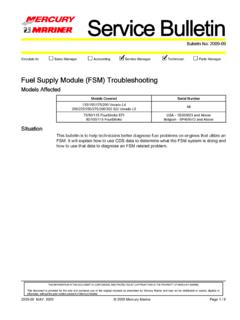Transcription of BARKLEY’S Quick-Check for Adult ADHD Diagnosis
1 BARKLEY S Quick-Check for Adult adhd DiagnosisPatient Name: Date: Instructions: This interview is intended to be used to conduct a quick interview screening for the likely existence of Attention- Deficit/Hyperactivity Disorder in adults (age 18 or older). Interview the patient by asking them the following items. Then place a check mark in the column if they answer Yes to that item. Note: This scale does not constitute a formal Diagnosis of adhd but only a means of quickly determining if a patient may have the disorder.
2 If so, a more thorough evaluation may be indicated. Current adhd SymptomsInterviewer, say: I would like to ask you a number of questions about your behavior during the past 6 months. For each behavior I ask you about, I want to know if it occurs often: that is, I want to know if this behavior occurs frequently or more often than in other people of your age group. You should not elaborate on the answers unless I ask you to do so. Just tell me, yes or no, whether these dif ficulties occur often for you or not. (Note: repeat the word Often periodically as you proceed through this list) Do you: check if Yes1.
3 Often make decisions impulsively?M2. Often have difficulty stopping activities or behavior when you should do so?M3. Often start projects or tasks without reading or listening to directions carefully?M4. Often have poor follow-through on promises?M5. Often have trouble doing things in proper order?M6. Often drive with excessive speed?M7. Often become easily distracted by extraneous stimuli?M8. Often have difficulty sustaining attention in tasks or leisure activities?M9. Often have difficulty organizing tasks and activities?
4 MTotal the number of check marks for Total Symptoms Current 2009, 2006 Dr. Russell BarkleyProduced by Jones and Bartlett Learning, Sudbury, MASAMPLE Areas of ImpairmentInterviewer, say: If you had any problems I just mentioned, did these problems interfere significantly with your ability to function as well as others in the following areas? In your: check if Yes1. Occupation or job?M2. Social life?M3. Educational activities?MTotal the number of check marks for Total Areas Recall of Childhood BehaviorInterviewer, say: Now I would like to ask you some questions about your behavior during your childhood years.
5 Think back to when you were between the ages of 5 to 12 years, such as when you were in elementary school. For each behavior I ask you about, I want to know if it occurred often back when you were a child; that is, I want to know if this behavior occurred frequently or more often than in other children. Again, you should not elaborate on the answers unless I ask you to do so. Just tell me, yes or no, whether these dif ficulties occurred often for you when you were a child. When you were a child, did you: check if Yes1.
6 Often fail to give close attention to details or make careless mistakes in your work?M2. Often have difficulty sustaining attention in tasks or fun activities?M3. Often feel restless?M4. Often avoid, dislike, or were reluctant to engage in work that required sustained mental effort?M5. Often forget things in your daily activities?M6. Often interrupt or intrude on others?MTotal the number of check marks for Total Symptoms Childhood ScoringYesNoDoes the patient have 6 or more current symptoms of adhd ?MMAnd Does the patient have 4 or more childhood symptoms of adhd ?
7 MMAnd Does the patient have 2 or more areas of life impairment?MMIf yes to all of above, they have an 87% chance of having adhd , a 0% chance of being classified as normal without any disorder, and a 13% chance of having a psychiatric disorder other than Barkley, and Murphy, Identifying New Symptoms for Diagnosing adhd in Adulthood. adhd Report. 2006;14(4): 7 11. 2. Barkley, and Murphy, (Book in Press). Guilford Press: New York, 2007. Produced by Jones and Bartlett Learning, Sudbury, MA 2009, 2006 Dr. Russell BarkleyOrdering information available







